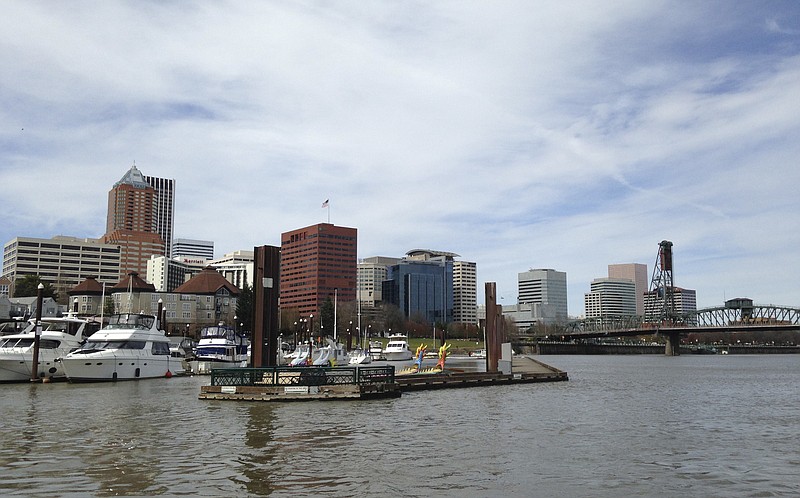PORTLAND, Ore. (AP) - Fiercely proud of its reputation as one of the most environmentally minded cities in America, Portland is reeling from the discovery of poisonous heavy metal "hot spots" in the air and ground.
Amid the crisis, two top state air regulators have resigned, residents are rushing to the doctor to get tested, and politicians in this city of 600,000 are scrambling to do damage control. Federal officials have also launched a nationwide review of small art glass-making factories, the suspected source of Portland's contamination.
"This is very much at odds with our view of ourselves and where we live, and that dissonance is one of the reasons why this is such a big deal for Portlanders," said Mayor Charlie Hales, whose city's liberal politics and embrace of walkability, recycling, farm-to-table dining and organic food are often lampooned on the TV series "Portlandia."
Air pollution hot spots with high levels of cadmium, arsenic and chromium were detected recently around two makers of colored glass. Emissions around one of the factories contained arsenic at 150 times the state safety benchmark and cadmium at 50 times. Long-term exposure to such substances is linked to lung and bladder cancer, kidney disease and other ailments.
Both glassmakers have voluntarily suspended use of the metals, which they had been using for years without being subject to regulation, until they can install pollution-control devices.
As testing continues, state and city health officials have tried to reassure residents there is no imminent health threat. But many people aren't buying it.
Jessica Applegate, who launched the Eastside Portland Air Coalition with her neighbors, wonders whether her daughter's long-time medical problems stem from the heavy metals. She lives in one of the hot spots a half-mile from Bullseye Glass Co.
"My daughter, who's 16 and born and raised in this house and neighborhood, she has chronic kidney, urine issues," she said. Applegate said she is "pretty terrified" as she awaits the results of her daughter's lab tests.
The furor has been especially painful because Portland is often called the Greenest City in America, and its ethos has shaped Oregon state politics as well. Not far from one of the city's pollution hot spots, Gov. Kate Brown a few weeks ago signed the first state law in the nation to order the phase-out of coal to generate electricity.
The crisis has exposed what some activists say are gaping holes in regulation of the environment.
Smaller glassmakers such as Bullseye Glass and the other business under suspicion, Uroboros Glass, are exempt from U.S. Environmental Protection Agency regulations governing heavy metal emissions. State officials can impose their own rules, such as requiring furnace filters, but are not required to do so. And Oregon's Department of Environmental Quality does not.
Adding to the uproar, DEQ officials admitted recently that they knew of high levels of heavy metal emissions in Portland for at least a decade but said they took no action because they were repeatedly unable to pinpoint the source.
The glassmakers weren't identified as the likely culprits until after the U.S. Forest Service began discovering the hot spots more than a year ago through samples of moss from trees throughout Portland, a common pollution-monitoring method in Europe. DEQ then did its own air tests and published the results in early February, triggering the public outcry.
In early March, the DEQ's director since 2008 stepped down, citing health reasons, and a DEQ air quality manager left, too.
Linda George, a professor of environmental sciences at Portland State University, said that when it comes to heavy metals, the EPA essentially tells states, "You decide on your own what risks you're willing to tolerate and you decide on your own benchmarks and how you're going to reduce risks."
"To me, that's like completely nutty," George said.
EPA officials declined requests for an interview but said in a statement that the federal Clean Air Act gives state and local agencies the lead role in regulating such substances and "provides much flexibility to states so that their programs can reflect local situations and needs."
The EPA is now reviewing more than a dozen other small glassmakers in California, Georgia, Indiana, New York, Ohio, Pennsylvania, West Virginia and Washington state. And Oregon Sens. Jeff Merkley and Ron Wyden are pressing Congress to increase federal funding to states and tighten EPA rules.
The state, meanwhile, is working to close its regulatory gaps and identify other potentially troublesome industrial sites around the city.
Skeptical of the state's track record, county and city officials are looking into creating their own air pollution-control authority for Portland.
"There are two things that are broken: One is the way they've been handling things so far," said Deborah Kafoury, chair of the Multnomah County Commission. "But also they have to work really hard to rebuild the public trust."
